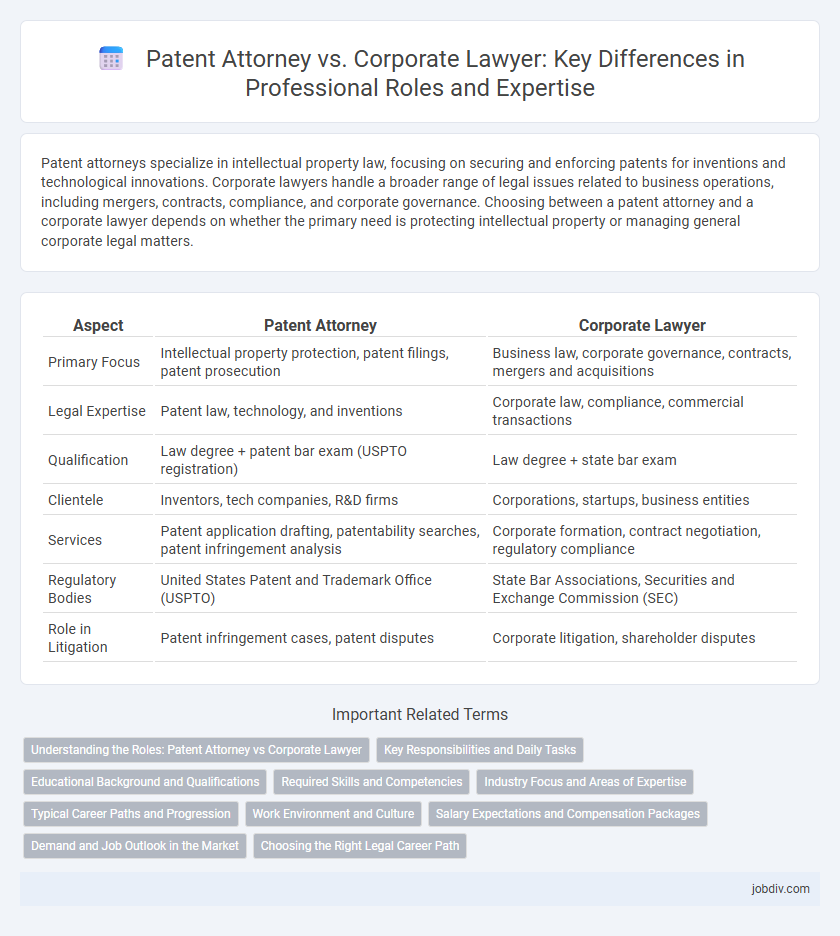Patent attorneys specialize in intellectual property law, focusing on securing and enforcing patents for inventions and technological innovations. Corporate lawyers handle a broader range of legal issues related to business operations, including mergers, contracts, compliance, and corporate governance. Choosing between a patent attorney and a corporate lawyer depends on whether the primary need is protecting intellectual property or managing general corporate legal matters.
Table of Comparison
| Aspect | Patent Attorney | Corporate Lawyer |
|---|---|---|
| Primary Focus | Intellectual property protection, patent filings, patent prosecution | Business law, corporate governance, contracts, mergers and acquisitions |
| Legal Expertise | Patent law, technology, and inventions | Corporate law, compliance, commercial transactions |
| Qualification | Law degree + patent bar exam (USPTO registration) | Law degree + state bar exam |
| Clientele | Inventors, tech companies, R&D firms | Corporations, startups, business entities |
| Services | Patent application drafting, patentability searches, patent infringement analysis | Corporate formation, contract negotiation, regulatory compliance |
| Regulatory Bodies | United States Patent and Trademark Office (USPTO) | State Bar Associations, Securities and Exchange Commission (SEC) |
| Role in Litigation | Patent infringement cases, patent disputes | Corporate litigation, shareholder disputes |
Understanding the Roles: Patent Attorney vs Corporate Lawyer
Patent attorneys specialize in intellectual property law, particularly handling patent filings, prosecution, and infringement issues, requiring technical expertise in specific scientific or engineering fields. Corporate lawyers focus on business-related legal matters such as mergers and acquisitions, compliance, contracts, and corporate governance to support company operations. Understanding these distinct roles helps organizations effectively manage legal risks related to innovation and corporate strategy.
Key Responsibilities and Daily Tasks
Patent attorneys specialize in intellectual property law, focusing on drafting, filing, and prosecuting patent applications while advising clients on patentability and infringement issues. Corporate lawyers handle a broad range of business-related legal matters, including contract negotiation, compliance, mergers and acquisitions, and corporate governance. Both professions require strong legal expertise, but patent attorneys demand technical knowledge in specific fields such as engineering or biotechnology to effectively protect innovations.
Educational Background and Qualifications
Patent attorneys typically hold a degree in science or engineering along with a law degree, qualifying them to navigate complex technical patents and intellectual property law. Corporate lawyers usually possess a Juris Doctor (JD) degree with a focus on corporate law, mergers, and acquisitions, emphasizing legal frameworks governing businesses. Both require passing respective bar exams, but patent attorneys must also pass the USPTO registration exam to practice before the patent office.
Required Skills and Competencies
Patent attorneys require specialized knowledge in intellectual property law, technical expertise in specific scientific or engineering fields, and strong analytical skills to draft and prosecute patent applications. Corporate lawyers must possess a deep understanding of corporate governance, contract negotiation, regulatory compliance, and risk management to effectively advise businesses on legal matters. Both roles demand excellent communication, critical thinking, and problem-solving abilities to navigate complex legal frameworks and client needs.
Industry Focus and Areas of Expertise
Patent attorneys specialize in intellectual property law, particularly in securing and enforcing patents across industries like technology, pharmaceuticals, and engineering. Corporate lawyers focus on business-related legal matters including mergers, acquisitions, compliance, and corporate governance within sectors such as finance, manufacturing, and retail. The distinct expertise of patent attorneys lies in patent prosecution and litigation, whereas corporate lawyers excel in contract negotiation and regulatory frameworks.
Typical Career Paths and Progression
Patent attorneys often begin their careers with a strong technical background in science or engineering, followed by specialized legal training in intellectual property law, progressing from associate roles to partner positions within IP firms or corporate legal departments. Corporate lawyers typically start with a law degree and focus on areas such as mergers and acquisitions, compliance, or contracts, advancing through associate, senior associate, and partner levels within law firms or in-house legal teams. Both career paths value continuous professional development, but patent attorneys usually require ongoing technical expertise updates, while corporate lawyers focus on evolving business and regulatory knowledge.
Work Environment and Culture
Patent attorneys typically work in specialized law firms, corporate legal departments, or intellectual property consultancies, where the culture emphasizes technical expertise and precision in patent drafting and prosecution. Corporate lawyers operate in diverse environments, including large law firms and in-house corporate teams, with a culture centered on broad legal compliance, contract negotiation, and business strategy alignment. The work environment for patent attorneys tends to be more niche and detail-oriented, whereas corporate lawyers engage in a dynamic, multifaceted legal landscape requiring adaptability and broad legal knowledge.
Salary Expectations and Compensation Packages
Patent attorneys typically command higher salary expectations than corporate lawyers due to the specialized technical expertise required in intellectual property law, with median annual salaries often ranging from $120,000 to $180,000. Corporate lawyers earn competitive compensation packages that vary widely based on industry, firm size, and location, generally averaging between $90,000 and $150,000 annually. Bonus structures, profit-sharing, and stock options frequently enhance corporate lawyer compensation, while patent attorneys may receive additional incentives tied to patent filings and litigation outcomes.
Demand and Job Outlook in the Market
Patent attorneys specializing in intellectual property law experience steady demand driven by innovation in technology, pharmaceuticals, and engineering sectors. Corporate lawyers maintain broad market relevance due to ongoing business transactions, mergers, compliance, and regulatory needs across industries. Job outlook for both professions remains positive, with patent attorneys benefiting from growth in patent filings and corporate lawyers adapting to evolving legal frameworks in global commerce.
Choosing the Right Legal Career Path
Choosing between a patent attorney and a corporate lawyer depends on interests in intellectual property versus business law. Patent attorneys specialize in securing and defending patents, requiring technical expertise and registration with the patent office. Corporate lawyers handle mergers, acquisitions, compliance, and governance, focusing on advising businesses on legal strategies and contractual matters.
Patent Attorney vs Corporate Lawyer Infographic

 jobdiv.com
jobdiv.com